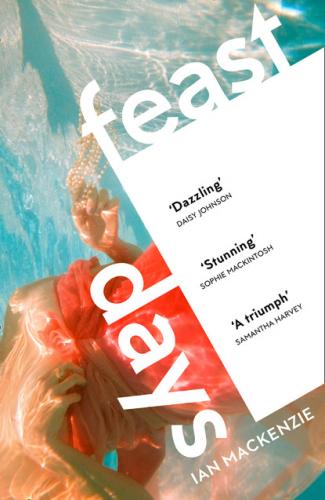4th Estate
An imprint of HarperCollinsPublishers
1 London Bridge Street
London SE1 9GF
This eBook first published in Great Britain by 4th Estate in 2018
Copyright © Ian MacKenzie 2018
Cover design by Heike Schüssler
Cover images © plainpicture/Goto-Foto/Tracy Jean Shields
Ian MacKenzie asserts the moral right to be identified as the author of this work
A catalogue record for this book is available from the British Library
All rights reserved under International and Pan-American Copyright Conventions. By payment of the required fees, you have been granted the non-exclusive, non-transferable right to access and read the text of this e-book on-screen. No part of this text may be reproduced, transmitted, down-loaded, decompiled, reverse engineered, or stored in or introduced into any information storage and retrieval system, in any form or by any means, whether electronic or mechanical, now known or hereinafter invented, without the express written permission of HarperCollins
Source ISBN: 9780008298548
Ebook Edition © June 2018 ISBN: 9780008306540
Version: 2019-01-31
‘This brilliant novel has no time for platitudes or conventional, ankle-deep morality; it plunges us straight to the depths. I’m not sure I know another book that feels at once so disaffected and so full of longing, so expansive in its sympathy and so terrifying in its candour. Devastating, funny and wise, it’s among the best novels I know about the fate of American innocence abroad’
GARTH GREENWELL
‘There is a sly, brooding intelligence at work in this novel, recalling for me the startling, highest times in American literature. MacKenzie is not just a great writer in the making – he’s already there’
BRAD WATSON
‘A beautiful, wry and honest exploration of belonging and not-belonging. The sharpness and precision with which the story is told reminded me in parts of Maggie Nelson … the prose is stunning’
SOPHIE MACKINTOSH
‘Brilliant. A pervasive sense of unrest, both large and small scale, social and personal, [is] conveyed in MacKenzie’s unruffled, discerning prose. MacKenzie has captured one of the most memorable narrative voices in recent fiction’
Publishers Weekly
‘Intelligent and atmospheric, Feast Days deftly limns the inner life of a foreigner whose own trajectory becomes increasingly bound up with the tensions and complexities of the society in which she has landed’
CHLOE ARIDJIS
‘Poignant and perceptive’
Booklist
‘The novel of the ugly American living abroad has bloomed into a genre all its own … Charles Portis’s Gringos, Ben Lerner’s Leaving the Atocha Station, Nell Zink’s The Wallcreeper … Ian MacKenzie’s second novel arrives as a worthy addition to that list’
New York Times
‘A story about love and power, luxury and empire, set in one of the most socially stratified countries on the planet. MacKenzie’s slender novel feels heavier than many novels twice its weight’
San Francisco Chronicle
For Kelsey—
first reader of everything,
fixes the mistakes no one else has to see
“Oh,” I said, putting my hat on. “Oh.”
—Mark Strand,
“I Will Love the Twenty-first Century”
Contents
Copyright
Praise
Dedication
Epigraph
Per Diem
False Cognates
Financial Considerations
Beautiful Works of Art Guarantee a 100% Experience
The Children’s Party
Incidentals
The Disaster of Heterosexuality
You Have to be Able to Explain What the Gini Coefficient Is
Do You Want Something?
In Defense of this Life
Proto-romance
Texts
Return
Sympathy for the Wife
Acknowledgments
About the Author
Also by Ian MacKenzie
About the Publisher
My husband worked for a bank in São Paulo, a city that reminded you of what Americans used to think the future would look like—gleaming and decrepit at once. The protests began in late spring, although, this being the Southern Hemisphere, it was really the fall. I was a young wife.
So. We were Americans abroad. We weren’t the doomed travelers in a Paul Bowles novel, and we weren’t the idealists or the malarial, religion-damaged burnouts in something by Greene; but we were people far from home nevertheless. Our naivety didn’t have political consequences. We had G.P.S. in our smartphones. I don’t think we were alcoholics. Our passports were in the same drawer as our collection of international adapters, none of which seemed to fit in Brazilian wall sockets. My husband was in the chrysalis stage of becoming a rich man, and idealism was never my vice.
Our tribe was an anxious tribe. This was after Lehman Brothers, Fannie Mae and Freddie Mac, after Occupy—people were starting to talk about the economic crisis in the past tense, boxing it up in the language of history. The Great Recession. The name was
